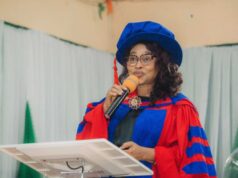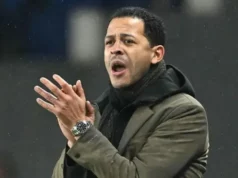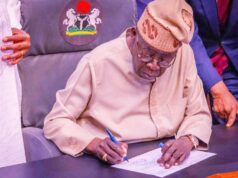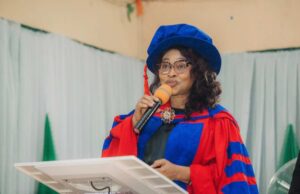Biography of Chief O. O. Okwara (1934-2020)
The first son of Nna Johnson Osonwa Okwara of Ndea Okwara Compound and Nnea Egbichi Kalu Ngwobia of Ndea Nsi Ezukwu, all in Ebem Ohafia, Okwara Osonwa Okwara has always been enigmatic – a curious blend of obstinate distinctiveness and the warmth of community, the buoy of entitlements and the dogged industry and assiduousness of a lone wolf, the irascible aspects of the nonconformist and the attentiveness, consideration, and the conciliatory aspects of the bridge-builder. These resulted in giving us a man of many parts and, like the proverbial elephant described by blind men, each person is wont to presenting the aspects that impact his perceptions the most. O. O. Okwara is, in most part, something of what these speckled tags communicate but without holding all these aspects in unison what we have are mere flakes or caricatures of the person, not the person as a person.
The Beginning
Born Okwara Ezikpe Okwara, he earned the nickname “Osonwa” – oso nnwa adighi igbenyi agba – impliedly, “a poor person would hardly afford what it takes to resolve childlessness.” This was fitting as his grandmother experienced some procreativity challenges. The nickname, however, became more popular than the given name and Osonwa stuck. Yet, as Shakespeare would ask in Romeo and Juliet, “What’s in a name afterall? …A rose by any other name would smell as sweet.”
Nna Johnson Osonwa Okwara was a teacher and a deeply religious man. As would be expected, he was also a very assertive (some would say, stubborn) personality. An inveterate petitioner that would not be cowered, when a misunderstanding with the Presbyterian Church could not be resolved, he founded the African Church where his younger son, Ukaike Osonwa, was baptized. He was the first person to build a house with corrugated metal sheets (zinc or, in the Ohafia dialect, agbagba) in Ebem – a faint hint to relative affluence and to Okwara Osonwa’s privileged childhood. Growing up, Okwara Osonwa was known to be hotheaded and a rabble-rouser. He had two responses to being rubbed the wrong way: punch the offender in the stomach (aiming straight at the stomach, says someone that really knew him) if proximal enough or throw a stone if the offender was a little removed. And he hardly missed! These, however, could not dim the sterling qualities in him; he was every whit the atypical youth of his time: single-mindedly ambitious and dogged in whatever he set his mind on. A likeable youngster, he had Late Elder Ikpo Anya (Teacher Ikpo), a notable and respected sage in the Ohafia community, as mentor.
It was not difficult for Okwara to be discovered at the Ohafia Central School, by the Reverend A. K. Mincha (Nna Mincha, as he was fondly called). The clergyman/educator would send Okwara on errands and had him handle some assignments that may look banal in today’s sophisticated world but represented major privileges at the time. Relating with the “white man” apparently broadened Okwara’s outlook on life; a born optimist that would hardly settle for nothing less than the very best, he started aspiring for the life of the “white man.”
He soon left for Calabar and from there moved on to the Cameroons to join his uncle, Teacher Odaka. There, he secured a job with the Cameroon Development Corporation (CDC) as a clerical officer in the Accounting department. Returning to Calabar and armed with strong recommendations from Reverend Mincha, he joined the Eastern Nigeria Development Corporation (ENDC). His first posting was to the Urban Rubber Estate, a rubber plantation that was formally owned by UAC but had been taken over by the ENDC. After a stint there as an Assistant Accountant, he was soon transferred to the Enugu office of the ENDC where he was adopted by late Chief Nwangoro, a chartered accountant that served as the Corporation’s chief accountant. Chief Nwangoro was of immense support and encouragement to the aspiring young man. His job at the Enugu office of ENDC soon raised his social status beyond his peers, according to one of his childhood friends; he started driving his first car – while most of his contemporaries were still in the labor market. He was later transferred again to Aba, as Head, Central Stores. Despite the perks attaching to his job with the Corporation, Okwara Osonwa still had his eyes at the very top and started studying to qualify as a professional accountant. It was at Aba that he started taking lessons that would qualify him for a scholarship to study accountancy in the UK. With support from his mentor, Chief Nwangoro, he finally made it.
Securing a scholarship to study in the UK led to ENDC posting him to the Leeds office, United Kingdom in 1964. He studied feverishly, perfecting his papers, and priming himself for the skies which he saw as his limits. From Leeds he moved on to the London office of ENDC and, still combining work and academic studies, he enrolled at the University of North London (Now London Metropolitan University). The scholarship soon expired as the civil war broke out. He joined the UAC on completion of his degree and professional programs. UAC later transferred him to their Lagos office and, from there, he joined Agip Nigeria Limited. His move to NNPC was actually a secondment from Agip. He ultimately grew to the position of Group Executive Director, Finance and retired at that position in 1994.
Family Life
It was at Calabar that Okwara Osonwa Okwara met the gentle lady that became his wife. Mrs. Grace Okwara Osonwa was the daughter of Nna Ibe Anya and Mma Ori Udo Kalu. Her father, Nna Ibe Anya, was a stockfish merchant at Calabar but, more importantly, a devout leader of the Faith Tabernacle Mission. The strict religious discipline he gave his whole family produced a daughter that, apart from her great looks, possessed a disarming composure and a resilient, unbreakable spirit that could hardly be resisted by the young (even if spectacularly handsome) Okwara. At that time, it looked like a meeting of opposites – the impetuous and the reflective – but, as they say, opposites attract and, in this instance, have stayed attracted till death. It was said that at his wedding, responding to the “…to love and to hold…till death do you part” invocation of the officiating minister, Okwara turned to his then friend and best man, Late Chief Ukoha Mba, and asked in a muted tone: “should I say ‘yes’ to this also?” Well, he did say “yes” and maintained the “yes” till death. Then the children started coming – Osonwa, Ngozi, Mina with Orieji, and Ibe bringing up the rear. Of course, they have all become established and enlarged the budding clan with several grandchildren.
Philanthropy, Community and Social Life
Of the Okpuma family extraction, Chief O. O. Okwara was indeed a family man. He traced and knew all his family members wherever they may be in Ohafia and beyond the Ohafia clan. His propensity for ikpa ikwu could only be matched by his unbounded openhandedness. More baffling was the fact that he could easily recount the filial connectedness of everyone in his family to the fourth generation or beyond. It is difficult to think of the Ebem and, to a large extent, the Ohafia community without mentioning Okwara Osonwa. His name recognition is as strong as his ebullient personality: everyone knew him, for plenty of good reasons as well as for hair-raising tales! Apart from individuals, his support to whole communities is unrivalled. His home in Lagos became the meeting place of so many associations, ranging from age-grade associations to town unions and to state-wide associations. In fact, people easily schedule meetings “at Chief Okwara’s residence” without him knowing about it, and they would hold their meetings without any molestation. Compared to other men of his status, Okwara Osonwa never had what would be called a security man; he merely had gatemen. On one occasion when he tried having his gateman request visitors to fill out forms, he would still reprimand the poor gateman for making this or that person “stand outside”; “Don’t you know him? Haven’t you seen him here before?” Etc. He soon abandoned the project because reading the influx of forms had become torture. If any person ever deserved the rubric of “a man of the people”, Chief O. O. Okwara certainly did.
He was infinitely accessible to young and old, rich, and poor. Later in life, he received his visitors right in his bedroom. Beyond money – and he had enough – he was also rich in counsel. Possessed of a certain boundarilessness in his familiarity with cultural and anthropological subjects about Ohafia, young people that engaged him in conversations often came out bemused at the depth of his knowledge. It is then understandable why he often became an opinion leader in many community contexts and was called in as a respected arbiter in conflict situations. His ranging array of titles is testimony to the communities he touched.
The Church – not only the Presbyterian community – also benefitted from his generosity. Singlehandedly rebuilding the St. Peters Presbyterian Church worship center at Ebem Ohafia is merely a hint at his large open-handedness towards the Church. Churches and Church bodies, ministers, and ministries were touched by his generosity. Apparently, in recognition of this, he was at a time privately invited to receive ordination as a ruling elder of the Presbyterian Church (an unfortunate move, we dare say – because it smacks of regarding the Elder’s ordination as a “reward” rather than a call to duty) but he humbly turned down those calls. He knew that people could serve God excellently in whatever stations they occupy in life; an accountant should concentrate on being a godly accountant. A church title is wholly unnecessary.
End of Life’s Journey
Chief O. O. Okwara departed this life peacefully, without struggles, and despite a dramatic life, without drama. Now we are left to piece together the variegated strands of complex life, to see what beauty – if any – the resulting tapestry holds. Tom Schulman’s Dead Poets Society would have Mr. Keaton charge his students to seize the day (the Latin carpe diem) and make their lives “extraordinary”. Chief O. O. Okwara surely seized the day and lived an extraordinary life. He lived his life to the fullest and exemplified the words of the 19th Century American philosopher, Henry David Thoreau:
I went to the woods because I wished to live deliberately, to front only the essential facts of life, and see if I could not learn what it had to teach, and not, when I came to die, discover that I had not lived. I did not wish to live what was not life, living is so dear…I wanted to live deep and suck out all the marrow of life…
Again, according to Mr. Keaton (Robin William), one of the purposes of poetry is “to woo women.” Chief O. O. Okwara’s life was, in many respects, poetic.
He is survived by his already mentioned children, grandchildren, and an only brother, Chief Ukaike Osonwa.
Elder James Osonwa Okwara (Son)
https://youtu.be/Qr_d1MQrI30









